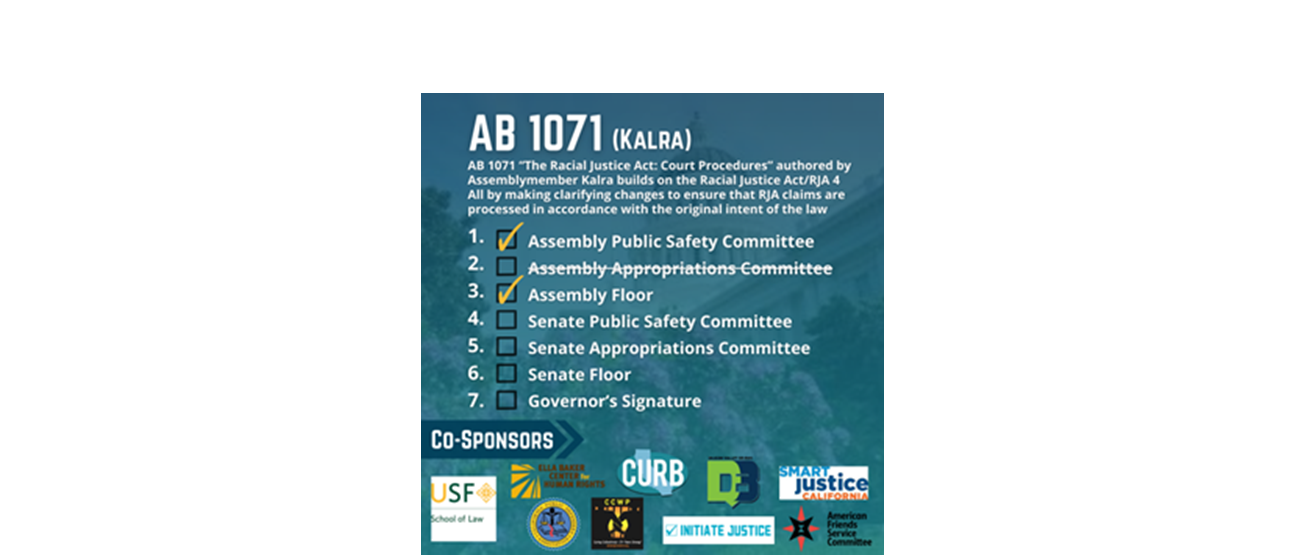
May 20, 2025
For Immediate Release
Media Contacts:
Courtney Hanson, (916) 316-0625 | Courtney@womenprisoners.org
Zena Hallak, Office of Assemblymember Ash Kalra, (916) 319-2025 | Zena.Hallak@asm.ca.gov
Bill Addressing Racial Justice in California Courtrooms Moves on to the California Senate
The bill strengthens the historic 2020 Racial Justice Act with clearer procedures that move California one step closer to eliminating racial bias in the courts
SACRAMENTO—On May 19, AB 1071 (Kalra)—the Racial Justice Act: Court Procedures—passed the Assembly Floor. AB 1071 will make clarifying changes to the 2020 Racial Justice Act to ensure proper implementation of the law, which was designed to eliminate racial discrimination and bias in the courtroom.
In 2020, the Legislature enacted the historic California Racial Justice Act (RJA), affirming that discrimination based on race, ethnicity, or national origin has a harmful effect on both individual defendants and our criminal legal system as a whole. The Legislature has amended the RJA twice (2022 - AB 256 and 2023 - AB 1118) to allow currently incarcerated individuals to make claims post-conviction and to provide procedural clarifications. While the RJA has already begun shifting the legacy of institutional racism in our courts, AB 1071 is needed to provide additional clarity and address some of the confusion happening in courts throughout the state.
Since the RJA became law, some courts have created procedural barriers that the Legislature did not intend. Issues with appointment of counsel, limitations on access to race-based data and other evidence of bias, and minimal remedies that do not address the gravity of proven violations are contrary to the RJA. AB 1071 will help resolve these issues and ensure RJA implementation matches the original commitment of the Legislature. The bill responds directly to requests for clarity raised by California Supreme Court justices tasked with deciding the proper interpretation of the law. AB 1071 ensures access to attorneys and information and clarifies available remedies for when an RJA violation is proven.
“The Legislature could not have been more clear: ‘We cannot simply accept the stark reality that race pervades our system of justice. Rather, we must acknowledge and seek to remedy that reality and create a fair system of justice that upholds our democratic ideals,’” said California Supreme Court Justice Liu in a recent dissenting statement in In re Mendoza (S287251), quoting the original language of the RJA. “In the face of judicial inaction,” Justice Liu called upon the Legislature to fine tune the existing law to ensure clearer guidance for courts throughout the state of California: “the Legislature may wish to clarify what showing is adequate to secure appointment of counsel and discovery under the RJA, and to require state and county agencies to make relevant charging, conviction, and sentencing data publicly available.”
“AB 1071 builds upon our efforts to ensure that communities disproportionately affected by systemic racism in our judicial system are afforded equitable access to justice. I am honored to collaborate once again with this committed coalition of sponsors and grateful to my colleagues for acknowledging the necessity of addressing racial discrimination and bias in criminal proceedings throughout the state," said Assemblymember Kalra.
“The Racial Justice Act is a historic law that helps our communities interrupt racism in the courts. But too many people are running into barriers trying to get the legal representation, access to information, and meaningful remedies they deserve,” said Katie Dixon, Policy Coordinator with California Coalition for Women Prisoners. “That’s why we are committed to passing AB 1071 (Kalra) to strengthen implementation and fulfill the original promise of the RJA—eliminating racial bias from California's criminal legal system.”
“The RJA came at a crucial moment in history when California acknowledged the racism that was happening with police violence and the criminal legal system,” said Cecilia Chavez, an organizer with Silicon Valley Debug. “It was a sigh of relief to voice the injustices we see everyday in the courtroom, an avenue to address those gut wrenching feelings of our loved ones experiencing bias. But, as motions have been filed, both families and defense attorneys have run into barriers to successfully litigate the case. This bill is necessary to further clarify the process and to help make the determination of whether a violation occurred or not.”
“AB 1071 (Kalra) will make the pathway to justice more clear under the RJA for incarcerated Black, Brown and Indigenous people who've experienced unacceptable discrimination. At a time when all Americans' civil rights are being threatened, California cannot postpone passing this bill and signing it into law,” said Amber-Rose Howard, Executive Director at Californians United for a Responsible Budget.
###